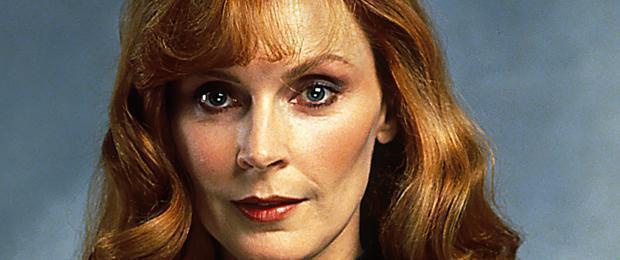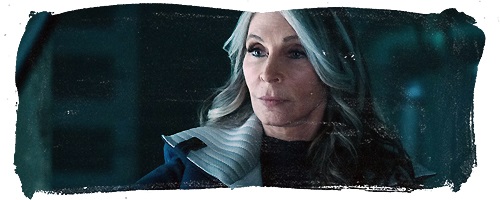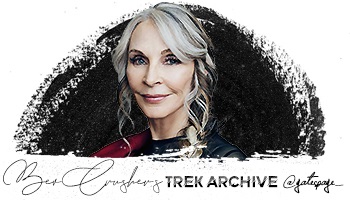
Star Trek Staff
September 12, 2012

Gates McFadden keeps her promises. The actress, signing autographs and posing for photos with fans at the Creation Entertainment mega-convention in Las Vegas last month, didn’t have time to talk in person with StarTrek.com, but she offered to do so by phone once she was back in L.A., where things might be “just a little calmer.” Note that she didn’t say “calm,” but rather “just a little calmer.” That’s because she’s been juggling any number of projects, including a recurring role on Franklin & Bash, play readings and stage acting roles, as well as directing shows, and often all of the above on behalf of the Ensemble Studio Theatre/LA, a theater company for which she serves as artistic director. In fact, their latest production, Year of the Rabbit, will open on September 15. Sure enough, though, McFadden set aside a half hour last week to chat with StarTrek.com, articulately reminiscing about her six years as Dr. Crusher on Star Trek: The Next Generation and in the TNG features, and enthusiastically filling us in on her current endeavors. Below, you’ll find part one of our interview, and visit StarTrek.com again tomorrow to check out part two.
You and your TNG co-stars have done at least one full-cast 25th anniversary reunion and have several more scheduled in the coming months. How are you enjoying those get-togethers?
McFadden: Oh, I’ve loved the joint convention appearances. I think it’s really fun for all of us to hang out again, see each other again. Usually, it was only at a Christmas party, and sometimes one of us would be off somewhere and we’d miss it. We see each other one on one a bunch, but it’s very hard to get all of us together. So that’s been great, and Calgary in particular, I have to say, was so much fun, because it was the first time. We were also being interviewed by CBS for the Next Generation Blu-rays. So we were really being thoughtful about it, because we were getting questions. I really loved it. Check back with me after we’ve done a whole bunch of other conventions. Who knows? We might be the old story. But it was, and it is, a great group of people. We do enjoy each other’s company.
Let’s dig into Dr. Beverly Crusher for a few minutes. Looking back, what was the meat on the bone for you in terms of the character? Was there enough meat on the bone? And what went unexplored? What did you not get to play and/or learn about this woman that you hoped to?
McFadden: That’s a huge question. The way that Gene Roddenberry had told me the part was, the reason I took the job was because it was a woman who had a very powerful position, was a commander, was a mother, was a good parent, was a leader and was somebody who cared about helping people. She had great humanity. She was that kind of a doctor, and it was very important to me that she was that kind of a doctor. And she was the love interest of Picard. So, she was a woman who also had sexuality. I feel that that got lost. That got lost when I came back.
When you returned in season three…
McFadden: The scripts were more for the Pulaski character, and I think it took several years for them to come back to it by that point. They’d gone in another direction, with more Klingon stories, with… beautiful stories, don’t get me wrong. But I feel, if the women would have a scene together, it’d be working out in the space. Or I became drama coach. I felt that there wasn’t enough meat, actually. I felt there was much more to explore. For example, with her relationship with her son – and this was actually part of why I had arguments with Mr. (Maurice) Hurley – I have a son, and we have very amazing talks. It is not just pack your lunchbox. Yes, of course, you have to have some of that, but any time there was any crisis with Wesley, it was always a male character who talked to him, who gave him the wisdom. I felt that was something that bothered me. And I just said, “It seems to me that you can be a strong woman and you can also be a loving woman.” I feel that now people are portraying that very well. I see that all over in things that are written. But there times I did feel that there was writing that was not as nuanced for the female characters.
You actually shared very little screen time with Denise Crosby in season one or with Marina Sirtis during the six years you worked with her. How ironic was it to direct Crosby in House of Gold, which you did last year for EST/LA?
McFadden: Denise was fantastic in the show. It was one of my best experiences. She and I didn’t have one scene together when we were on Star Trek, not one moment where we’d actually had a scene between us. The women never did anyway. We had become such good friends. We have so much in common. It’s so funny that it’s happened completely after Star Trek, because we didn’t get those opportunities on Star Trek. We’re sorry that didn’t happen because we think it could have been very interesting. I adore Denise. I think she’s an amazing actress. She’s certainly amazing to direct. She’s so flexible and gifted. And we laughed. We had a wonderful time. She recently did a reading of a new Nicholas Kazan play that she was devastatingly good in. She’s really, really developed over the years into quite an extraordinary actress, I think.
Earlier on, you mentioned your son. James was born during the run of TNG and you used to joke that he grew up on the set. He was probably just three or four when the show ended, but what was it like for him when mom didn’t go to work anymore on the Enterprise?
McFadden: He was only three, but he’d learned how to walk on the bridge. He loved the fish in the ready room. There were things that he just loved. He knew the crew and he knew all of the actors. In fact, he couldn’t recognize them out of makeup for a while. But what my son always got was the camaraderie and the work process, and that there is a discipline to it and it’s also fun. That continued after Star Trek, when I did the show Marker in Hawaii. We were in Hawaii, and he’d come to the set. He understood the work, whereas I never let him watch Star Trek. Now he’s watched the show on his own, when he’s older, but I never wanted to show it to him (at the time) because I was Mom. I wanted him to understand the process of work, the process of creating a show and all of the aspects. He loved that, I think. He loved being around so many people. It was a great community. I don’t know how he would have felt if it had continued for a long time. I think he wanted to have more attention from me, and I was really, really wanting to do that, which is why when we were in Hawaii for Markerit was quite different. The locations were under a beautiful waterfall and watching whales breaching in the distance. They weren’t in a smoke-filled pretend cave up on Planet Hell.














